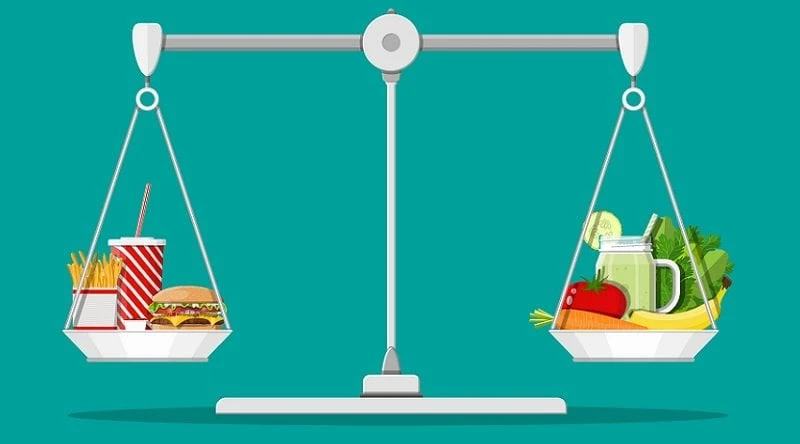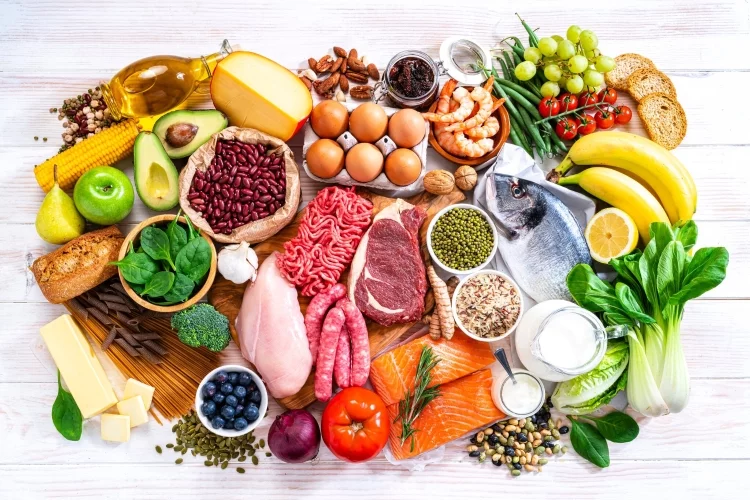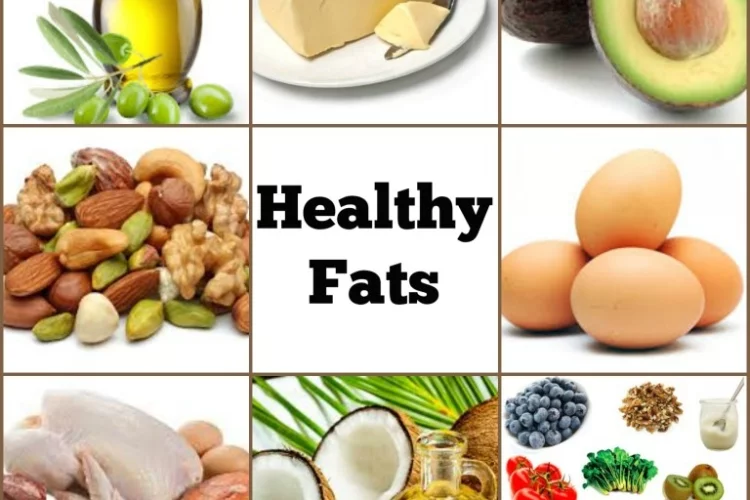by Christopher Jones
With a little planning, a splash of color and a variety of nutrients, it’s easy to bring balance to your plate. No more boring or bland meals filled with processed products. It’s time to select healthy whole foods that create some contrast! Balanced meals that include a variety of healthy ingredients provide more energy, improve mental cognition, reduce illness, support weight loss and improve your overall health.
Contents

Start by covering 1/4 of your plate with about 4 ounces of high-quality muscle-building protein. Protein serves as the body’s basic building blocks for growth and energy, and is essential for maintaining cells, tissues, and organs. Protein is great for metabolism and is also highly satiating. Good protein sources: eggs, meat, poultry, fish, seafood, wild game, etc.

Next, add nutrient-dense non-starchy veggies to cover at least 1/2 of your plate. Add starchy veggies, gluten-free grains, legumes and/or fruit to fill the rest of your plate. Healthy carbs are digested slowly, which helps you feel full longer and keeps blood sugar levels stable.
Colorful non-starchy veg: kale, broccoli, spinach, cauliflower, cabbage, bok choy, squash, etc.
Starchy veg: sweet potato, red potato, beets, parsnips, etc.
Grains/legumes: (gluten-free & soaked) quinoa, wild rice, beans, etc.
Antioxidant-rich fruits: berries, cherries, green apples, etc.
Breakfast: eggs + spinach + mushrooms + bacon
Lunch: turkey + greens + tomato + avocado + Paleo mayo
Snack: cottage cheese + raspberries + slivered almonds
Dinner: steak + asparagus + red potato + butter
Include some natural fats to cook with or add as a topping. Natural fats add flavor, decrease cravings, promote satiation and increase nutrient absorption. Sources: avocado, avocado oil, coconut oil, palm oil, olives, olive oil, butter, bacon, nuts, seeds, etc.
Natural fats are not only helpful for losing weight, but essential for sustainable fat loss and maintaining good health. Unfortunately, fats got the bad rap from years of poor research. Many of the anti-saturated fat studies lumped healthy saturated fats into the same category as man-made hydrogenated and trans fats. Other studies were done with rancid fats, which should always be avoided. With faulty research and clever “low-fat” packaging, it’s easy to believe the myth that fat is evil.
The truth is, eating fat does NOT make you fat. Eating too many processed and refined foods high in carbs and sugars make you fat. Natural fats are actually your best friend for fat loss as they provide high satiation, increase nutrient absorption, stabilize blood sugar levels and balance hormones. Hormones are what control whether you gain or lose weight. Eat to make your hormones happy and you’ll find fat loss to be effortless and delicious.
Fats have zero effect on your blood sugar levels, making them ideal for reducing body fat, preventing diabetes and balancing hormones (adrenals, thyroid, etc.). Add natural fats at every meal and with snacks to maintain even energy throughout the day. Fats also lower the glycemic load (GL) of any type of carb, meaning the sugar from that food enters the blood at a much slower rate. The lower the GL, the better.
Eating fat stimulates the release of leptin, a hunger hormone that tells your brain when you’re “full.” This is why fat is highly satiating, helps prevent overeating, reduces cravings and keeps you full long after you eat.
Natural fats make everything taste better, including vegetables. Adding a little natural fat to your veggies will make it a lot easier to eat more veg.
Studies show adding fat to your food actually increases the nutrient content of your meal and improves the absorption of fat soluble vitamins (A, D, E and K), omega-3s, protein and minerals.
Fats, including cholesterol, are used to make hormones. Fat is crucial for male and female reproductive health. Eating too few or the wrong kinds of fats can cause infertility, PMS and early menopause in women, while causing low testosterone and infertility in men.
The human brain is nearly 60 percent fat, particularly essential fatty acids like omega-3s (especially DHA). These fats control everything from cognitive function to mood. Getting adequate cholesterol in your daily diet helps increase the “feel-good” neurotransmitter serotonin, which decreases anxiety and depression.
Saturated fats such as those found in butter, coconut oil, and red palm oil contain beneficial fatty acids such as butyric acid, lauric acid and myristic acid. These unique fats are anti-microbial, anti-viral, and anti-fungal, which support a healthy gut and strong immune system.
Fats provide joint lubrication. They’re also are essential for absorbing fat soluble vitamins and metabolizing calcium for healthy bones. Saturated fats are particularly effective at reducing dental cavities and plaque.
Good fats, particularly those high in omega-3s, decrease inflammation and can reduce the risk of developing disease. Saturated fats decrease heart disease risk by reducing lipoprotein (a) levels.

Healthy Fats: pastured animal fats (eggs, beef fat, pork fat, bacon, butter, ghee, etc.), wild seafood (salmon, sardines, fish oil) avocado, extra virgin olive oil, unrefined coconut butter/oil/milk, unrefined palm oil, organic nuts and seeds. Good fats come from unrefined animal fats and naturally occurring fats from plants. They tend to be higher in saturated fat, monounsaturated fat and omega-3s.
Symptoms of Healthy Fat Deficiency: fatigue, weight gain, depression, anxiety, mood swings, difficulty concentration, dementia, hypoglycemia, insulin resistance, hormone imbalances, constant hunger, increased cravings, digestive issues (gas, bloating, diarrhea, acid reflux), dry hair and skin, brittle nails, vitamin and mineral deficiencies, infertility and reproductive problems.
 |
 |
 |
 |
 |
 |
 |
 |

About Christopher Jones
Chris is a true globetrotter. He has been to many destinations and tried different types of food from all over the world, yet he still loves finding new places and tasting their specialties. Chris has always had an entrepreneurial spirit and so he decided to go back to school at age 24 for his MBA at University of San Francisco so that he could have a better understanding of business strategy in order to start his own company. His favorite motto is “how can one live well, travel well, and work well without having good food every time?”
Check for FREE Gifts. Or get our Free Cookbooks right now.
Disable the Ad Block to reveal all the recipes. Once done that, click on any button below
 |
 |
 |
 |